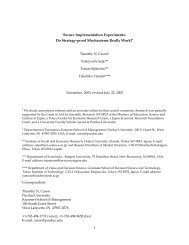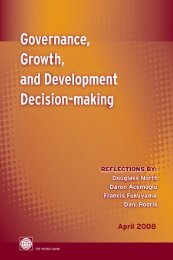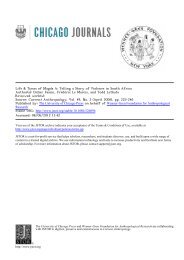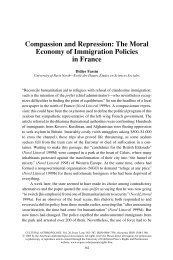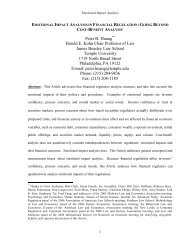The Tools of the Master Slavery and Empire in Nineteenth Century ...
The Tools of the Master Slavery and Empire in Nineteenth Century ...
The Tools of the Master Slavery and Empire in Nineteenth Century ...
Create successful ePaper yourself
Turn your PDF publications into a flip-book with our unique Google optimized e-Paper software.
THE TOOLS OF THE MASTER 7<br />
<strong>of</strong>ficials <strong>and</strong> descendants, an Ottoman-Egyptian elite. Although many had been born <strong>in</strong><br />
Egypt, <strong>the</strong>y were <strong>of</strong>ten most comfortable speak<strong>in</strong>g <strong>and</strong> writ<strong>in</strong>g <strong>in</strong> Turkish. As mentioned<br />
above, Muhammad `Ali himself came from this group, <strong>and</strong> he <strong>and</strong> his successors did not<br />
identify <strong>the</strong>mselves as Egyptians 16 even as Muhammad `Ali succeeded <strong>in</strong> mak<strong>in</strong>g <strong>the</strong> rule <strong>of</strong><br />
Egypt <strong>the</strong> dynastic right <strong>of</strong> his family <strong>and</strong> his successful conquest <strong>of</strong> <strong>the</strong> Sudan <strong>in</strong>corporated<br />
it under Egyptian auspices. <strong>The</strong> new class <strong>of</strong> bureaucrats he created thus grew up with <strong>the</strong><br />
Sudan as an Egyptian colony. His gr<strong>and</strong>son, <strong>the</strong> Khedive Isma`il, cont<strong>in</strong>ued both policies,<br />
<strong>the</strong> expansion <strong>of</strong> Egyptian control <strong>of</strong> <strong>the</strong> Sudan, <strong>and</strong> <strong>the</strong> <strong>in</strong>stitutionalization <strong>of</strong> a native-born<br />
bureaucracy. But his expansionism exceeded his budget, <strong>and</strong> hav<strong>in</strong>g drawn loans from<br />
British, French <strong>and</strong> o<strong>the</strong>r European banks that he could not repay, Isma`il made Egypt<br />
vulnerable to <strong>the</strong> economic, <strong>the</strong>n <strong>the</strong> political control, <strong>of</strong> foreign governments, eventually<br />
lead<strong>in</strong>g to his deposition <strong>in</strong> 1879 <strong>and</strong> <strong>the</strong> British occupation <strong>in</strong> 1882.<br />
<strong>The</strong> vulnerability to external control brought on by Isma`il’s debts <strong>in</strong>curred <strong>the</strong> wrath<br />
<strong>and</strong> fears <strong>of</strong> a group <strong>of</strong> army <strong>of</strong>ficers who led Egypt’s first patriotic rebellion <strong>in</strong> 1881. At <strong>the</strong><br />
same time, Egyptian control <strong>of</strong> <strong>the</strong> Sudan, <strong>of</strong>ten enforced by high-rank<strong>in</strong>g European army<br />
<strong>of</strong>ficers, provoked <strong>the</strong> rebellion <strong>of</strong> <strong>the</strong> Sudanese Mahdi which successfully took control <strong>of</strong><br />
almost all <strong>of</strong> <strong>the</strong> Sudan by 1884. In just four years, Egypt had become a de facto colony <strong>of</strong><br />
Great Brita<strong>in</strong> <strong>and</strong> lost its own colony <strong>in</strong> <strong>the</strong> Sudan. It is <strong>in</strong> this period, <strong>and</strong> <strong>in</strong> response to<br />
<strong>the</strong>se struggles, that certa<strong>in</strong> pivotal groups <strong>of</strong> Egyptians began to dist<strong>in</strong>guish <strong>the</strong>mselves<br />
culturally <strong>and</strong> ethnically from <strong>the</strong> Ottoman-Egyptian elites who occupied <strong>the</strong> highest posts<br />
<strong>in</strong> <strong>the</strong> country. From <strong>the</strong> first, <strong>the</strong> development <strong>of</strong> Egyptian nationalism was marked by a<br />
triangular colonialism.<br />
Invasive Abolitionism<br />
<strong>The</strong> British <strong>in</strong>vestigation <strong>of</strong> African slavery <strong>in</strong> Egypt <strong>and</strong> <strong>the</strong> Ottoman <strong>Empire</strong> had begun <strong>in</strong><br />
<strong>the</strong> middle <strong>of</strong> <strong>the</strong> n<strong>in</strong>eteenth century but took on greater momentum with <strong>the</strong> reign <strong>of</strong> <strong>the</strong><br />
Khedive Isma’il. Although <strong>the</strong>re was an ages-old traffic <strong>in</strong> white slaves as well, <strong>the</strong> British<br />
<strong>and</strong> Foreign Anti-<strong>Slavery</strong> Society did not pursue <strong>the</strong> issue <strong>of</strong> trade <strong>in</strong> Circassian <strong>and</strong><br />
Caucasian slaves with <strong>the</strong> Ottoman sultan or <strong>the</strong> Egyptian khedive, so deeply connected to<br />
<strong>the</strong> entire <strong>in</strong>frastructure <strong>of</strong> <strong>the</strong> military <strong>and</strong> <strong>the</strong> royal families had this system become. 17<br />
It<br />
was also clear that by <strong>the</strong> middle <strong>of</strong> <strong>the</strong> n<strong>in</strong>eteenth century <strong>in</strong>creased Russian hegemony<br />
over <strong>the</strong> Caucasus mounta<strong>in</strong>s <strong>and</strong> ensu<strong>in</strong>g struggles with Circassian populations had cut <strong>of</strong>f<br />
most <strong>of</strong> <strong>the</strong> potential supply <strong>of</strong> those slaves. What few rema<strong>in</strong>ed came from with<strong>in</strong> Anatolia<br />
itself. 18 African slavery was treated as an entirely different matter. Isma’il’s efforts to exp<strong>and</strong><br />
Egyptian authority beyond <strong>the</strong> source <strong>of</strong> <strong>the</strong> Nile <strong>in</strong>to East Africa co<strong>in</strong>cided with <strong>the</strong> close<br />
attention that British abolitionists were pay<strong>in</strong>g to <strong>the</strong> trade <strong>in</strong> African slaves as, hav<strong>in</strong>g been<br />
successful <strong>in</strong> end<strong>in</strong>g <strong>the</strong> practice <strong>in</strong> British territory, <strong>the</strong>y tried to abolish <strong>the</strong> trade network<br />
<strong>in</strong> o<strong>the</strong>r parts <strong>of</strong> <strong>the</strong> world.<br />
In Great Brita<strong>in</strong>, <strong>the</strong> abolitionists were aided by a tight network <strong>of</strong> <strong>in</strong>formation about<br />
Africa which was fed through <strong>the</strong> cooperation between <strong>the</strong> Royal Geographic Society, <strong>the</strong><br />
British Anti-<strong>Slavery</strong> Society <strong>and</strong> <strong>the</strong> Church Missionary Society. In a triangular trade <strong>of</strong><br />
<strong>in</strong>formation, explorers—such as Dr. David Liv<strong>in</strong>gston, Speke <strong>and</strong> Grant, Charles Gordon<br />
<strong>and</strong> Samuel Baker—became celebrated experts <strong>of</strong> <strong>the</strong> Geographic Society for <strong>the</strong> first-h<strong>and</strong><br />
<strong>in</strong>formation <strong>the</strong>y brought or sent home from <strong>the</strong> Nile Valley or Lake Victoria. <strong>The</strong>ir stories<br />
about <strong>the</strong> victimization <strong>of</strong> <strong>in</strong>nocents that slavery wrought <strong>in</strong>spired both Protestant <strong>and</strong><br />
Catholic Church missionaries to set up stations <strong>in</strong> different African heartl<strong>and</strong>s. Sketches<br />
<strong>the</strong>y sent home <strong>of</strong> enslaved Africans encouraged <strong>the</strong> urgent appeals <strong>of</strong> <strong>the</strong> Anti-<strong>Slavery</strong>



